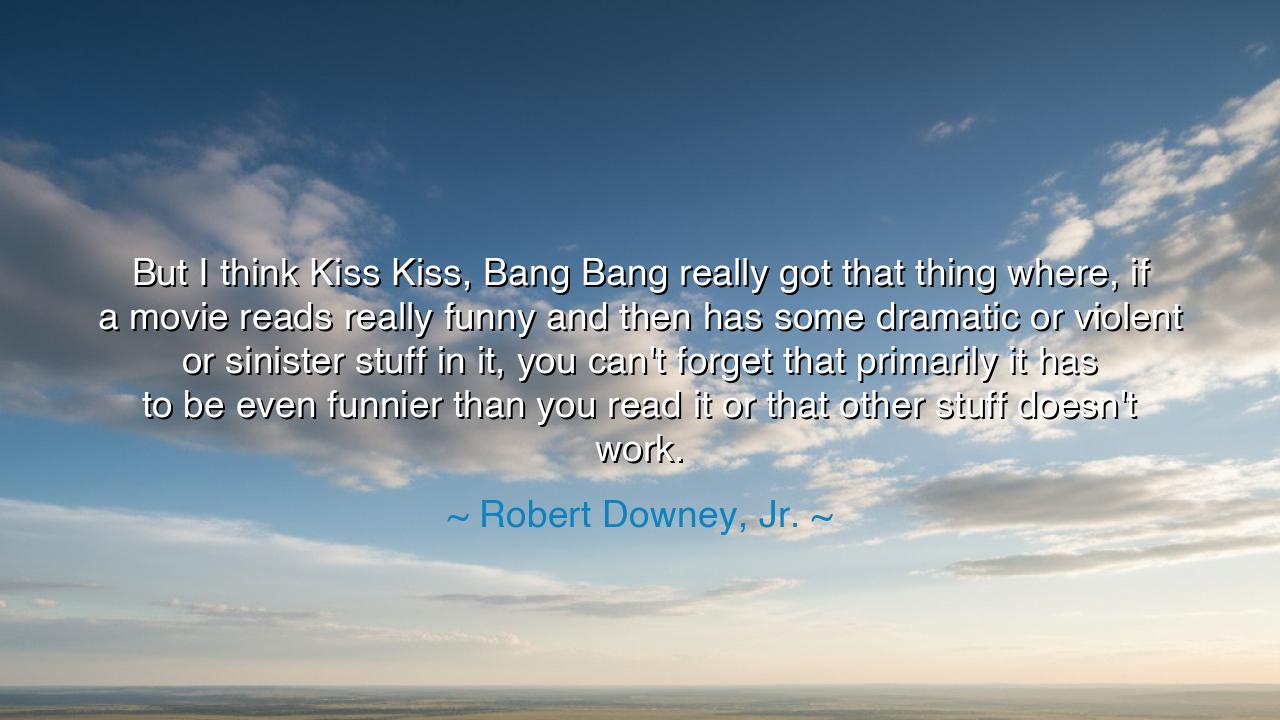
But I think Kiss Kiss, Bang Bang really got that thing where, if
But I think Kiss Kiss, Bang Bang really got that thing where, if a movie reads really funny and then has some dramatic or violent or sinister stuff in it, you can't forget that primarily it has to be even funnier than you read it or that other stuff doesn't work.






“But I think Kiss Kiss, Bang Bang really got that thing where, if a movie reads really funny and then has some dramatic or violent or sinister stuff in it, you can't forget that primarily it has to be even funnier than you read it or that other stuff doesn't work.” — thus spoke Robert Downey Jr., a man who has lived the full arc of tragedy and redemption, and who knows well that laughter and darkness are not enemies, but companions in the great dance of storytelling. In this reflection, he offers more than an observation about cinema; he offers a truth about balance, contrast, and the strange alchemy that gives art — and life — its deepest power. For what he says of film is also true of the human soul: that humor, when joined with pain, gives birth to truth.
The origin of this quote lies in Downey’s work on the 2005 film Kiss Kiss, Bang Bang, written and directed by Shane Black. It was a film that dared to blend tones — comedy with crime, irony with sincerity, laughter with danger. Downey, whose performance shimmered with both wit and woundedness, understood that this balance was not accidental. He speaks here of the essential discipline of tone — that the more darkness one dares to show, the more one must uplift it with light. “It has to be even funnier than you read it,” he says, for humor is not decoration but foundation. Without it, the shadows grow too heavy; with it, the story breathes, allowing the audience to face terror without despair, to feel sorrow without surrender.
Downey’s insight echoes the wisdom of the ancients, who knew that light and darkness must coexist to reveal the full truth of existence. The Greek tragedians, masters of human emotion, often placed moments of laughter amid their most solemn dramas. In Sophocles’ Antigone, even as death looms, the chorus breaks into banter about fate and foolishness. This was not carelessness — it was craftsmanship. For to confront the horror of destiny, the audience must be allowed to breathe. Laughter opens the heart so that sorrow may enter more deeply. Downey, whether knowingly or not, channels this same eternal principle: the comic and the tragic are not opposites, but parts of the same human pulse.
What he calls “dramatic or violent or sinister stuff” are the storms of narrative — the conflict, the cruelty, the raw truth that tests the soul. Yet even in the midst of such turmoil, the artist must remember that laughter is the anchor. This is not to mock suffering, but to balance it, to remind the audience that the world, for all its chaos, still holds joy. The laughter of Kiss Kiss, Bang Bang is not hollow; it is a defiance of despair, a declaration that life, even when brutal, still glimmers with absurdity and wonder. Without that humor, the violence would feel cruel, the darkness overwhelming. But with it — as Downey says — everything “works.” The funny is not the opposite of the serious; it is what gives the serious its meaning.
We see this same truth embodied in history’s greatest storytellers. Consider Charlie Chaplin, who turned poverty, oppression, and even madness into laughter. In The Great Dictator, he faced the shadow of tyranny not with silence, but with comedy — making the world laugh at what it feared, and through laughter, making it think. Like Downey’s observation, Chaplin’s genius lay in understanding that the funnier the humor, the more deeply it could carry truth. If it was not funny enough, the sorrow would crush it; but when laughter is sharpened by brilliance, it pierces the armor of despair and lets in light.
Downey’s reflection also speaks to the artist’s inner struggle — the delicate task of keeping truth alive amid competing emotions. He says, “You can’t forget,” as though warning against a kind of artistic amnesia. It is easy, when surrounded by violence and darkness, to lose sight of laughter, to be consumed by pain or cynicism. But the true artist — like the true soul — must resist this. One must hold fast to humor, not as denial, but as survival. For humor is courage made audible; it is the act of standing before the abyss and saying, “Still, I will laugh.” That laughter gives power to endure and clarity to see the beauty hidden even in brokenness.
Let this, then, be the lesson: in every craft, in every struggle, remember the balance of tones. When life feels dark, seek the humor; when laughter feels empty, honor the sorrow behind it. Do not let pain erase joy, nor joy blind you to truth. Whether you tell stories, lead others, or simply live each day, understand what Downey understood — that energy, truth, and humor together form the soul’s equilibrium. Life, like art, cannot survive on seriousness alone; it needs the spark of laughter to make its meaning whole.
Thus spoke Robert Downey Jr., whose own life has been a story of tragedy redeemed by humor, chaos tempered by self-awareness. His words remind us that the truest art — and the truest life — is not about choosing between laughter and darkness, but about mastering both. For when we can laugh in the face of the sinister, when we can find joy even amid ruin, we become, like him, not only performers of life, but its alchemists — turning pain into power, and humor into truth everlasting.






AAdministratorAdministrator
Welcome, honored guests. Please leave a comment, we will respond soon